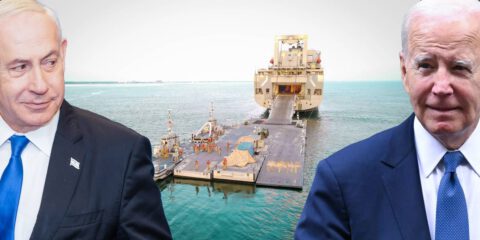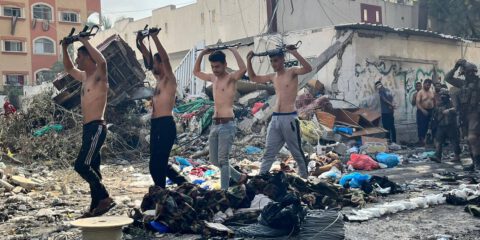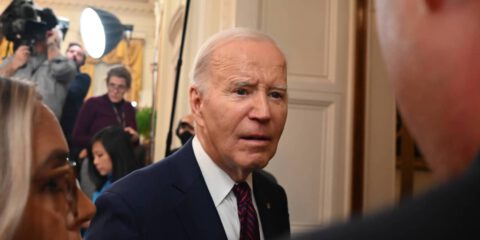Russia’s hostile stance in the war against Hamas strengthens Israel’s affiliation with the Western camp. Israel should refrain from public criticism of Moscow.
Since the beginning of the war in Gaza, official Russian spokesmen have refrained from condemning Hamas and on the whole have been careful to stick to general statements addressed to “both sides.” Establishment commentators and Russian social networks have adopted an unequivocal anti-Israel line.
President Vladimir Putin has adopted the Palestinian narrative, explaining the current eruption of violence as a result of Israel’s “settlement policy” and its decades-long failure to provide a political solution to the Palestinian problem. Moreover, he claims, “an extraordinary sense of injustice in this regard nests in the heart of every Muslim.” Putin and official Russia blame the United States for the crisis because of its “monopolization” of the Israeli-Palestinian peace process in recent decades, implying that it has pushed Russia out of that process. They are critical of American backing for Israel in the war, arguing that problems should not be solved by force and that political negotiations should be launched in accordance with United Nations resolutions.
Putin addressed the issue five times during the first week of the war, and it was only on October 12, that he “corrected” his message somewhat by acknowledging that Israel had been subjected to an attack unprecedented in its cruelty and scope and recognizing its right to self-defense. Nevertheless, he again refrained from referring to Hamas’ attack on Israeli civilians. At the same time, he warned that Israel’s blockade of Gaza could be similar to the siege of Leningrad during World War II. He was referring to the Wehrmacht’s 900-day siege (1941–1943) of the city, which resulted in the deaths of 600,000 to 1.5 million people, and which, in Russian historiography, is considered one of the worst crimes committed by the Nazis. It took Putin nine days to express his condolences over the death of Israeli civilians; he did so in an October 16 phone conversation with Prime Minister Benjamin Netanyahu as part of a round of calls with Middle Eastern leaders (on the same day Putin also spoke with the leaders of Syria, Iran, Egypt, and the Palestinian Authority).
Since the beginning of the war, the Russian Foreign Ministry has been engaged in intensive diplomatic activity, mainly vis-à-vis Muslim countries. None of the dozens of press releases it has issued included a condemnation of Hamas or recognition of the severity of the attack on Israel. Instead, the Ministry called for the implementation of UN resolutions and an immediate return to Israeli-Palestinian negotiations. Moreover, it condemned the role played by the US, ridiculed Western support for Israel, and claimed that Western weapons supplied to Ukraine had found their way to Hamas. Russia has also prevented condemnation of Hamas at the UN Security Council.
Senior Hamas officials Mousa Abu Marzouk and Ali Baraka have both stated that they have been in contact with Moscow and that the Russians conveyed a sympathetic message to the organization following the attack on the Gaza border communities inside Israel. Russia has not denied this, and there are reports that Deputy Foreign Minister, Mikhail Bogdanov may have met with senior Hamas overseas leadership during his recent visit to Qatar.
At the same time, claims that Russia was involved in the planning and execution of the Hamas attack are not credible. Firstly, on the political level, Hamas-Russia relations lack intimacy and have been conducted in the shadow of the organization’s suspicion of Russia. This in light of the fact that in recent years Moscow has maintained positive relations with Israel. Secondly, on the operational level, Russia, unlike the Soviet Union, does not provide extensive military aid without immediate gain in return. More importantly, it is hard to believe that Hamas could have kept the planned attack secret had it shared its plans with state actors outside the organization. Even senior figures in Hamas’ political wing claimed that they were updated only after the attack began. However, Russian weapons may have reached Gaza through a third party (such as Iran), and credible evidence has been published that Hamas has laundered money through the Russian financial system.
While Russian officials have spoken in a more “balanced” manner (referring to “both sides,” and calling for them to refrain from escalation or harming civilians, etc.) during the second week of the war, establishment commentators and “patriotic” channels on social networks have adopted an overtly anti-Israeli line. “Propaganda mouthpieces” echo the Kremlin’s message sheets and have made the war the centerpiece of their coverage. From October 7-15, the official Russian news agency RIA Novosti published more than 2,300 articles about the war (about a third of its overall coverage), devoting more than half of its daily op-eds to the conflict. One of these op-eds stated that the West encourages Israeli genocide against the Palestinians, and compared the Israeli leadership’s remarks about the attacks in Gaza to Hitler’s blessing to the Wehrmacht forces before they invaded the Soviet Union.
Propagandist Vladimir Solovyov, who prides himself on his Jewish origins (and therefore supposedly has a moral right to criticize Israel), argued that the IDF’s actions in Gaza are an example of cruelty to civilians, unlike the Russian army, which does not allow itself to take similar steps in Ukraine. The leader of the Russian province of Chechnya, Ramzan Kadyrov, who serves as one of the most prominent spokesmen for Moscow in the Muslim world, declared Russia’s support for the Palestinians.
Russian social networks are full of pro-Palestinian propaganda, including some that are contemptuous of Israel’s military might. They express the feeling of many commentators that Israel is part of the camp of Russia’s enemies, while Iran, Syria, Hezbollah and Hamas are allies. Many commentaries look at the war in Gaza through the prism of a struggle between civilizations, with Russia, China, and Muslims struggling against the West, represented by Israel. These channels along with traditional media feature antisemitic references and caricatures.
Over the past decade, the Israeli-Palestinian conflict has been on the margins of Moscow’s agenda. Russia (along with the other powers) came to terms with the impasse in the peace process and avoided any criticism of Israel even during major military operations in Gaza, and in Judea and Samaria.
The Kremlin’s hostile stance toward Israel stems first and foremost from the growing competition between Russia and the United States and the desire to take advantage of the crisis to strengthen Moscow’s global image compared to Washington’s. The Russians believe that the war in the Middle East is shifting American-Western attention away from the war in Ukraine, in a way that will help Moscow tip the military balance there in its favor. In the past two years, Moscow has presented itself as the leader of the “global majority,” i.e., the non-Western countries, who are allegedly struggling with Western neo-colonialism. Like the Soviets, who recognized that support for the PLO helped them forge a common agenda with the Third World, Putin’s Russia supports Hamas and the Palestinians in an attempt to improve its image in the eyes of Muslim countries.
Russia fears that decisive American action in favor of Israel (and the possibility of an American-Saudi-Israeli defense agreement) will rehabilitate Washington’s standing among Middle Eastern countries. Moreover, Russia is concerned about the expansion of the conflict, which could harm its partners, Iran and Hezbollah, and even weaken Russia’s grip on Syria if the Assad regime becomes involved.
Alongside global considerations, Russia’s negative stance stems from increasing conflicts of interest between Moscow and Jerusalem concerning the war in Ukraine. While Israel has tried hard not to sever ties with the Kremlin, the “intimacy” that existed in relations between the two countries and their leaders before the war in Ukraine has eroded. For example, since Netanyahu’s return to the prime minister’s office, there had not been a single phone conversation between the leaders, until Putin called on October 16 in an attempt to demonstrate diplomatic initiative. The accelerated rapprochement between Moscow and Tehran, who now define their relations as a “strategic partnership,” has also cast a cloud over Israeli-Russian relations.
Russia’s public stance toward Israel and the war in Gaza reflects a historic low point in relations between the two countries. Such a hostile attitude toward Israel and its envelopment in anti-Western rhetoric by the Russian establishment propaganda apparatus have not been seen in Moscow since the 1970s and 1980s when Soviet propaganda incorporated hostility to Zionism into the communist ideological base.
Much of Russian messaging in recent days is consistent with the characteristics of “modern antisemitism” – conflating Israel and the Jews, accusing them of every possible sin, including comparing them to Nazi Germany. These messages are, in addition to other “indications” of a return to Russian state antisemitism, similar to those that existed in the Soviet era. Putin emphasizes Russia’s tolerance for different ethnic groups and boasts of Jewish friends. In recent months, however, he has publicly shamed Jewish opposition figures. The line Putin has adopted in the current crisis, comparing the war in Gaza to the siege of Leningrad, is evidence of a turn for the worse in his attitude toward Israel.
Looking ahead, the glaring contrast between strong American backing for Israel and Russia’s offensive stance shows Jerusalem that the opportunities inherent in its relations with Moscow are diminishing. Russia’s ability to play a significant political role during the current war is limited. Its direct influence on Hamas and Hezbollah is close to zero.
Furthermore, as the Biden administration links the assistance package for Israel to Ukraine’s, Jerusalem should help the White House on Capitol Hill. Israel should also approve a visit to Israel by Ukraine’s President Volodymyr Zelensky.
Israeli-Russian relations throughout the war are expected to be tense, and Israel should not refrain from criticizing Russia if it produces hostile statements or actions. Nevertheless, there is no need for Jerusalem to confront Russia publicly. Even if the Russians do not help, they should interfere as little as possible.
JISS Policy Papers are published through the generosity of the Greg Rosshandler Family.
Photo: Shutterstock








 - בניית אתרים
- בניית אתרים